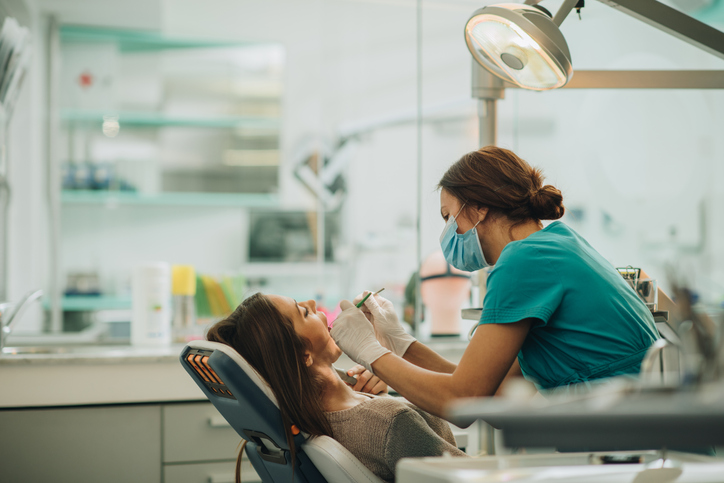
Oral health is a crucial component of overall wellness, yet it’s often overlooked until problems arise. Preventive dental care focuses on maintaining healthy teeth and gums to avoid the need for costly and painful treatments later on. By adopting a proactive approach to oral hygiene, individuals can significantly reduce their risk of cavities, gum disease, and other dental issues. In this blog, we’ll explore the key aspects of preventive dental care, its benefits, and why it should be a priority for people of all ages.
What Is Preventive Dental Care?
Preventive dental care refers to the practices and treatments aimed at preventing oral health problems before they develop. This includes regular dental checkups, professional cleanings, fluoride treatments, sealants, and good at-home oral hygiene habits. The goal is to identify early signs of dental issues and intervene before they escalate into more serious conditions. Dentists often recommend biannual visits for routine exams and cleanings as part of a comprehensive preventive care strategy. Experience Trusted Wicker Park Dental Care at Urban Smiles Chicago, where your comfort and oral health are our top priorities.
Preventive care is not just about avoiding cavities—it’s a comprehensive approach to keeping your mouth, teeth, and gums in peak condition. From early diagnosis of oral cancer to monitoring jaw alignment in growing children, these early visits allow dentists to take a holistic view of your oral health.
Benefits of Preventive Dental Care
The benefits of preventive dental care extend beyond the mouth. Early detection and treatment of dental issues can help prevent infections from spreading to other parts of the body. For example, untreated gum disease has been linked to serious health conditions such as heart disease, diabetes, and respiratory infections. Maintaining good oral hygiene can therefore play a critical role in overall health and wellness.
Additionally, preventive care can save you money. Catching problems early means simpler, less invasive, and more affordable treatment options. Instead of needing a root canal or tooth extraction, you might only need a small filling or a fluoride rinse. Over time, these small interventions add up to significant savings and less stress.

The Role of Routine Dental Visits
One of the pillars of preventive dental care is regular visits to the dentist. These appointments allow for a thorough cleaning and an in-depth examination of your teeth and gums. During these visits, dental professionals remove plaque and tartar that daily brushing and flossing may miss. They also screen for early signs of decay, gum disease, and oral cancer.
Routine visits also provide an opportunity for patient education. Your dentist or hygienist can guide you on proper brushing and flossing techniques, recommend the best dental products, and offer dietary advice to protect your teeth. These conversations are personalized, helping you to form habits that are specifically tailored to your needs.
At-Home Oral Hygiene Practices
While dental visits are essential, much of preventive dental care happens at home. Brushing your teeth at least twice a day with fluoride toothpaste and flossing daily are foundational habits. Using mouthwash, maintaining a balanced diet, and avoiding tobacco products also contribute to good oral health.
Children, in particular, benefit from early education on the importance of dental hygiene. Teaching kids how to brush properly and making dental care a fun, positive experience can set them up for a lifetime of healthy habits. Adults, too, must stay consistent with their routines, especially as aging increases the risk for gum disease and tooth loss.
The Impact on Children’s Oral Health
For children, preventive dental care is essential to ensure proper oral development. Pediatric dentists monitor the growth of teeth and jaws, applying sealants to protect young molars and recommending orthodontic evaluations when needed. Establishing dental visits early helps children become comfortable with the dentist and sets a precedent for regular care throughout their lives.
Fluoride treatments and dental sealants are common preventive measures in pediatric dentistry. Fluoride strengthens tooth enamel, making it more resistant to decay, while sealants provide a barrier against plaque in hard-to-brush areas. These interventions can dramatically reduce the risk of cavities in children and teens.
Preventive Care for Seniors
As we age, our oral health needs change, making preventive dental care even more important. Seniors are more susceptible to conditions like dry mouth, root decay, and gum recession. Additionally, many older adults take medications that affect oral health or have chronic conditions that make dental care more challenging.
Regular dental checkups can help detect issues early and prevent them from worsening. Dentists can also provide guidance on managing dry mouth, selecting the right dental products, and maintaining oral hygiene despite physical limitations. For seniors with dentures or implants, routine care ensures that their prosthetics continue to function properly and comfortably.
How Diet and Lifestyle Affect Oral Health
Preventive dental care is not limited to dental hygiene—it also involves lifestyle choices. Diet plays a significant role in oral health. Foods and drinks high in sugar can lead to cavities and enamel erosion, while calcium-rich and fibrous foods help strengthen teeth and stimulate saliva production.
Smoking and excessive alcohol consumption are other factors that negatively impact oral health. Tobacco use, for instance, increases the risk of gum disease, tooth discoloration, and oral cancer. By adopting a healthy lifestyle, you support the effectiveness of your preventive dental care routine.
The Dentist’s Role in Long-Term Health
Dentists are often the first to detect signs of systemic diseases that manifest in the mouth. Conditions like diabetes, vitamin deficiencies, and even certain cancers can present early symptoms during a routine dental exam. This makes regular dental visits an integral part of a broader healthcare strategy.
When your dentist identifies early warning signs, they can refer you to the appropriate medical professional, ensuring that issues are addressed promptly. This interdisciplinary approach enhances both oral and overall health outcomes, underlining the value of preventive dental care as part of your wellness journey.
Conclusion
Preventive dental care is a smart investment in your long-term health and well-being. Through regular dental visits, proper at-home hygiene, and healthy lifestyle choices, you can maintain a bright smile and avoid the discomfort and expense of major dental procedures. Whether you’re caring for your own teeth or guiding your children toward good habits, preventive care provides the foundation for a lifetime of healthy smiles. Don’t wait until you’re in pain—schedule your next checkup and take the first step toward better oral health today.






